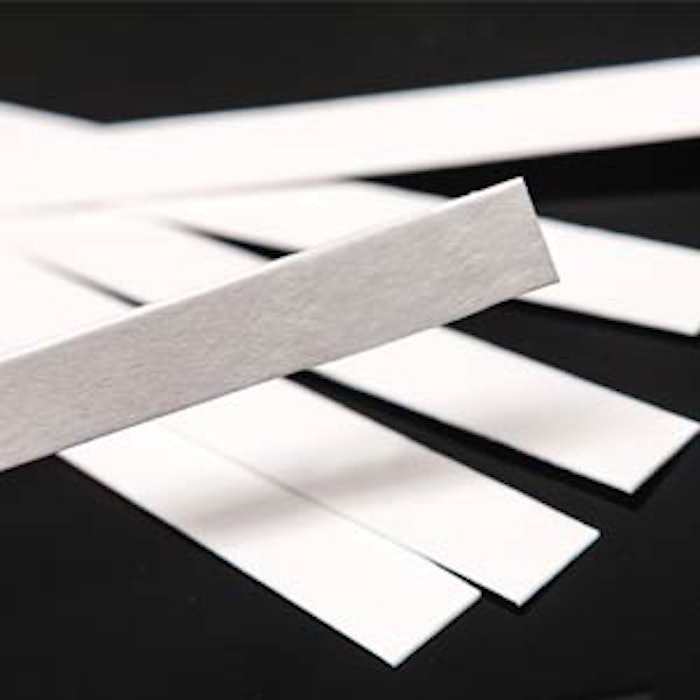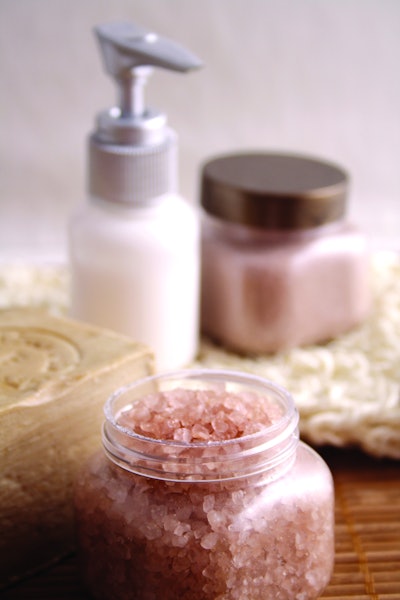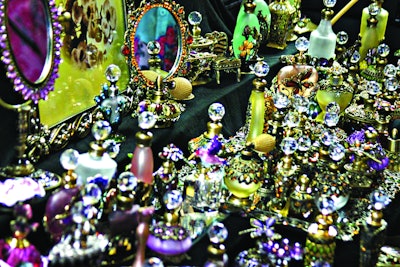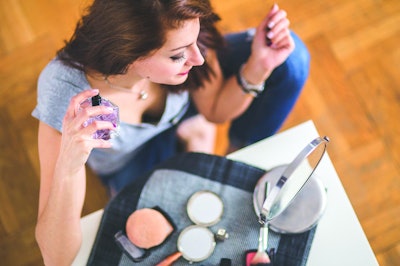
What happens when there is a fragrance evaluator between a brand and a fragrance house? Are they gatekeepers, critics, interpreters, co-creators, all of these or something else?
Evaluators working within fragrance houses are project managers whose contribution is crucial to success. Larger fragrance houses in particular are competitive environments, where multiple perfumers will be tasked with the same brief, but ultimately everyone is interested in their team getting a win.
Independent evaluators aren’t working for the benefit of the fragrance house—their client is the brand, and while they challenge the perfumer to meet the brief in much the same way as an in-house evaluator would, their job can end up being quite different.
Many independent and niche brands commission work from fragrance houses and external perfumers instead of having an in-house perfumer. Some brands are set up by amateur perfumers who do everything themselves: formulate and compound the fragrances and run the business, too. The terms “indie” and “niche” are fuzzy around the edges and difficult to define, but could be classified according to: type of ownership, size of company, distribution channels, target market and style of fragrance.
Roger Duprey, whose career started in Bush Boake Allen 50 years ago, became the U.K.’s first research perfumer and went on to work for Quest, then Givaudan and now owns his own consultancy. Duprey explains the difference: “The tier one companies didn’t do anything without market research and still don’t. Saying that, they end up with a shelf of perfumes about which they know the consumers’ preferences; whereas it seems with a lot of the small indie brands, no one has done any market research at all and if they have, it’s probably been asking a family member.”
While many niche fragrance brands do not conduct any market research or do not have an official marketing department, they are still in the business of creating consumer products.
Can You Afford Not to?
Some independent brands and perfumers view evaluation as inauthentic, unnecessary and part of big business. Niche brands may view evaluation as something that would meddle with creativity, but it could enable it instead.
There is perhaps a misunderstanding in what a well-trained evaluator can offer: potentially the difference between a costly mistake and a viable business. An inexperienced brand owner might not know how to get the best out of a fragrance house. They might not be able to communicate their needs well enough which could result in a mismatch of project and perfumer, or in other problems. Even fine fragrances can have stability or concentration issues, and when niche brands move on to other fragranced products, such as candles and body lotions, technical expertise becomes a necessity.
There is perhaps a misunderstanding in what a well-trained evaluator can offer: potentially the difference between a costly mistake and a viable business.
John O’Shaughnessy, author, Why People Buy, said, “In a sense, buying actions are always acts of self-expression in that they embody the consumer’s own goals and wants and express how consumers define themselves.” Why People Buy explains in detail why for consumers to want a certain product they must also believe it coheres with their lifestyle, values and belief systems.
For a niche consumer, the attitude might be a mix between, “I’m a maverick. I don’t conform. I’m artistic. I’m unique. I take risks. I don’t care what anybody else thinks,” or “I am wealthy and I want to show that I can afford the most expensive and exclusive products.”
Virginie Daniau started her fragrance career in 1997 at Quest (later Givaudan) and established her own business in 2009. She helps brands develop and launch fragrances and in some cases gets involved in much more than fragrance evaluation.
“I often get clients telling me about a problem, but instead of seeing it as a problem I get really interested! Half of the time what they see as a problem actually becomes their unique selling point. It’s kind of magic, actually.
You simply can’t do things in the same way that bigger companies do. You are smaller; you are already different, so you should shout out about it. It’s what’s going to make you stand out. Instead of trying to cover it up and hide it, be honest about it,” said Virginie.
“For me, honesty in brands and everything else is very important because it’s so rare on the market. And I mean across the range—I don’t want to push one side of the industry over the other. When people are creating fragrances because they love them, not just because they thought they might be successful, people recognize that and respond to it,” she added.
A Balancing Act
Nick Gilbert started in fragrance retail sales, moved on to training and eventually he landed a role at Penhaligon’s and L’Artisan Parfumeur, where he was involved in marketing and fragrance evaluation. He explains the fine line between a commercially successful and unique product: “There is always an issue of getting commerciality and everything else right because you don’t want the fragrance not to be on-brand and not to express the message. Sometimes you end up with something so commercial that you almost feel like you’re letting down all the other things. It becomes too calculating.”
If you are specifically targeting a market segment and trying to mimic a best-seller in that market, it can lack that authentic passion which consumers respond to. “You do, of course, need the bread-and-butter fragrances and, yes, you can create a best-seller by producing something that is very easy for the consumers to understand, but you can also create a best-seller by launching an artistic, creative scent,” added Nick.
It certainly seems that being too cynical and calculating about targeting specific market segments is more of a necessary evil than a recipe for success according to the independent evaluators.
Virginie has a classic example: “I tend to go back to Yves Saint Laurent and the amazing things he was doing. When he was launching Opium, he was adamant that the bottle had to be like this, and the pompom had to be made by hand and it cost the Earth, but that’s what he wanted and that’s the kind of vision you need. If you have that vision it almost doesn’t matter who you are and where you are. It’s what people buy—people buy into that vision and passion and there’s nothing you can do to fake it.”
People respond to authenticity in advertising, which triggers emotional responses, a necessary risk in marketing. If you make a creative product too risk-free, you end up polishing all the emotion out of it and creating something too easily interchangeable.
“I keep saying to brand owners that you need to be confident in your vision because that’s what people connect with,” added Virginie, “so if I were to give a recipe, it would be this: Have a vision, have the passion, and if you don’t, just don’t do it.”
Bridging the Gap
Working within a fragrance house, the team is focused on winning the brief. Independent evaluators bridge the gap between brands and perfumers. Brand owners often have trouble interpreting their messages to a fragrance brief. They may also not know how to deal with fragrance houses or what to expect.
Virginie knows her position between perfumer and client. “Sometimes I am the missing link between what the client wants in their own words and the perfumer. I try to translate — but I translate in a certain way because I know how a fragrance house works and how a perfumer works. I know what is really going to happen internally at the fragrance house and that’s very, very important.”
While the independent evaluators have a closer relationship with the client, approaching fragrance evaluation from the outside in has unique challenges. “When you’re working as an external evaluator, you don’t have access to the company shelf to guide you and you don’t necessarily know what ingredients they have available either, so you don’t know what the perfumer’s portfolio is. That means an external evaluator has to be far more specific and one may even say more dictatorial,” said Roger.
The best evaluators never tell you to use more or less of a particular raw material. They tell you to make it more rosy and if it’s not rosy enough you get sent away to do it again.
Creative Differences
“There is a difference between whether someone is a very technical perfumer and whether someone is more of an artistic perfumer. And yes, they can be both, but what leads them is, I think, what matters,” explained Nick.
“When it comes to creative work, people are quite passionate about what they do and it’s normal; it’s human. You create something only because you think it’s right. Otherwise you would do something different. So as a perfumer when you create a fragrance, it is extremely difficult to have a critical nose about your own work,” said Virginie.
“So, really, the role of the evaluator is to try to bring back some of that objectivity. And when I say objectivity, I mean educated objectivity. You know the client, you know the market, so you have to have all that knowledge in your head when you sit with the perfumer and smell,” she added.
Evaluators have to be aware of and make accurate judgements based on enormous amounts of data. They must have a deep understanding of their client’s needs, know what the target market will respond to, and keep up with current trends. These insights can bring in just the spark a perfumer needs to find a creative solution to a problem. The evaluator’s nose should also be attuned to finding technical problems such as issues with bloom or longevity. Meddling with creativity for the sake of it or being too prescriptive is not useful.
Roger has worked with many excellent evaluators during his perfumery career. “The evaluator’s job is to bring out the best in the perfumer’s abilities. The best evaluators never tell you to use more or less of a particular raw material. They tell you to make it more rosy and if it’s not rosy enough you get sent away to do it again,” he said.
“You’re never a critic and always aim for constructive comments,” said Virginie, “Your comments have to be backed up by solid reasoning and you have to know what you are doing.”
How Often is it Purely About Scent?
Of course, the success of a fragrance in the marketplace is never just about the smell. Has the brand got their marketing right in the first place? Is the price of the product right? Have they chosen the best distribution channels? Is the launch well-timed? What elements other than fragrance are influencing the consumer’s sensory impression? Is the brand able to tell a convincing story about the product and capture the consumer’s imagination in a way that reinforces the fragrant message in the bottle rather than fights against it?
Avery Gilbert, sensory psychologist and author of What the Nose Knows, has the following advice: “Context and expectation have a huge impact on odor perception—much larger than they have on vision or hearing. Smells are usually invisible and silent, so we are forced to rely on context to interpret them. Also, there is rarely a one-to-one relationship between an odor and a physical source, so we have to be open to suggestion.”
Virginie’s experience echoes this: “Let’s face it, how often is it purely about scent? That’s why a holistic approach is so important. If everything is pulling in the same direction, if the brand is accepted by the consumers, then it will work.”
The brand’s values and what buying into it means for the consumer is an important (if often subconscious) part of the purchase decision. That’s why brands sometimes need additional expertise from evaluators to make sure that the fragrance profile of their products matches what the rest of their brand is communicating.
“My experience has been that people are slowly learning and understanding more about this little world, and as much as we don’t seem to want to talk about it as an industry, people are beginning to understand it. I feel that if the industry addressed people correctly, we would all sell things more effectively. Ultimately people expect a certain level of quality and artistry in fragrances when they are paying a premium. And fair enough, I think,” added Nick.














